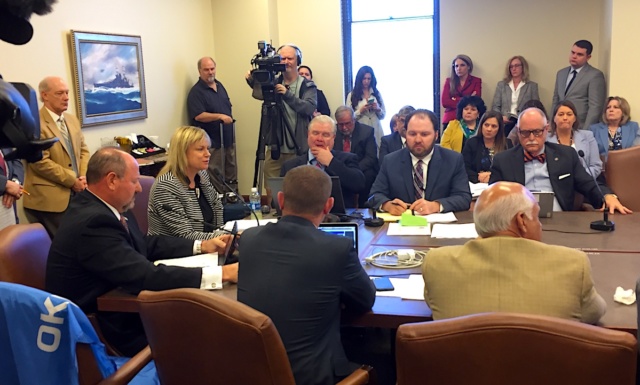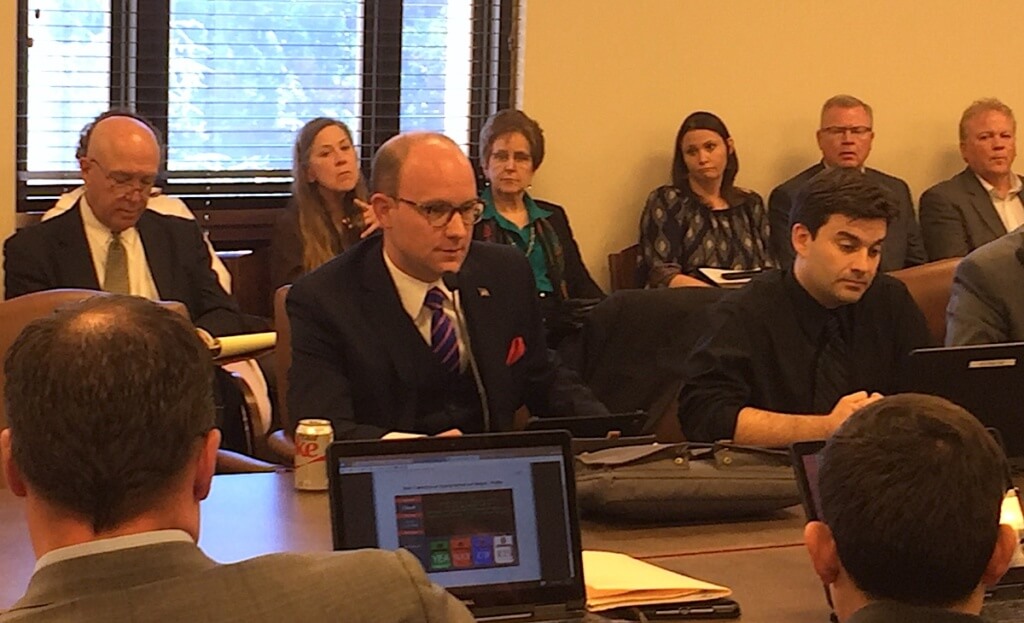
Chairwoman Leslie Osborn put a large package estimated to raise more than $400 million in front of the House Joint Committee on Appropriations and Budget this afternoon. While two Republicans joined Democrats who locked up in opposition to the measure, 18 GOP members voted yes, which will send the tax bundle to the House floor.
“This will be on the House floor Wednesday,” Osborn (R-Tuttle) said after the contentious meeting. Since the measure raises taxes, HB 2365 (embedded below) will require 76 votes to pass the House, meaning House Minority Leader Scott Inman (D-Del City) would almost certainly have to bring his caucus to the affirmation side.
The bundle includes the much-ballyhooed $1.50-per-pack cigarette tax, a controversial $0.06 hike in the state’s regionally low gas and diesel taxes, and the repeal of a set of oil-and-gas deductions that Osborn estimated will yield $50 million more in state tax revenue beginning with the next budget.
“When you vote against this bill or when you vote against this bill on the floor, what I need you to remember is what the resultant action of that will be,” Osborn said during debate on the bill Monday. “We weren’t joking when we put out the 14.5 (percent cut) scenarios. Our budget hole is $1 billion because of the things we must pay in addition to the $878 million (budget hole). We will close regional colleges (…) we will not have a teacher pay raise. We will layoff 25 percent of our troopers. Not furlough, layoff. We will close rural hospitals. We will close mental health services down.
“If that’s what you want, and if that’s what you think it means to be a good conservative Republican or a good person who just wants to thwart everything because you didn’t get the one thing you wanted under the candy cane on the Christmas tree, then vote against it. But these things are going to happen, and this is the first thing we are rolling out to try to fix that.”
Rep. Inman: ‘This game of legislative chicken’

While Osborn drew enough GOP votes for the bill to pass 18-8 in Monday’s committee meeting, she took substantial heat from Inman who repeatedly blasted the proposal for lumping the unpopular gas tax with the more popular cigarette tax.
He said those measures will disproportionately affect poorer Oklahomans. He also continued his call for repealing an exemption to the “gross-production tax” on oil and gas wells.
“We’ve been telling them all along that if they want to do a grand bargain to bring in significant revenue for the state that would include a cigarette tax, they’re going to have to include a gross-production tax as part of it,” Inman said during a separate House JCAB meeting April 27. “Right now, the debate has centered around a gasoline tax on middle-class families without touching the gross-production tax for wealthy oil and gas companies, and they know if they roll out that gas tax without bringing gross-production tax along the way, the gas tax will fail.”
Monday, Inman attempted to press Osborn on her negotiation strategy and whether she would bring a gross-production measure up down the road. She and other representatives repeatedly told Inman to focus on the components of HB 2365 that was being heard.
“Last year, we sort of played this game of legislative chicken with the tobacco tax,” Inman said, recalling the 2016 end-of-session drama that resulted in a relatively flat budget for health care agencies despite the tobacco tax failing on the House floor.
Rep. Earl Sears (R-Bartlesville) who held Osborn’s position last year, interrupted Inman to critique the pertinence of his statements to the bill, and vice-chairman Kevin Wallace (R-Wellston) prevented Osborn from having to answer one of the minority leader’s meandering questions.
Of gross-production tax proposals, Osborn said it and other revenue ideas may be considered down the road. Returning to the gas tax, she believed Oklahomans would rather pay the estimated $37-per-year extra at the pump rather than see schools languish, hospitals close and other services be cut.
She also cited statistics indicating that more than 40 percent of gas and diesel taxes are paid by non-residents in Oklahoma.
Inman emphasized the “regressivity” of a gasoline tax and said the state was facing its fiscal issues owing to low gross-production taxes and income tax cuts.
“We didn’t cut gasoline taxes too low,” he said Monday.
But Osborn countered by saying the bill disproportionately taxes the rich because it would remove the $50 million in oil-and-gas tax breaks. She also argued that the gas tax doesn’t affect one socioeconomic group more than another.
“Harold Hamm will pay $0.06 more at the gas pump (per gallon) just like everyone else,” she said.
A Democrat on the committee muttered in response: “He’ll be devastated, I’m sure.”
Rep. Proctor: ‘There are other options’
Rep. Eric Proctor (D-Tulsa) said he expected the bundle bill to fail on the floor Wednesday owing to bipartisan opposition.
“For me, this isn’t a question of Republican or Democrat. It’s a question to me of right or wrong, moral or not,” Proctor said. “It’s a question of what my faith teaches me (…). Shifting the tax burden from the wealthiest corporations to the middle class and to the poor, it’s not just, it’s not moral. We do not have to do it. There are other options.”
Proctor and Inman have set their sights on gross-production tax as one the primary options, but the oil and gas industry has pushed back heavily.
“The oil and natural gas industry in this state feels like this mess we’re in is not because we’re not paying enough,” said Tim Wigley, executive vice-president of government affairs for the Oklahoma Independent Petroleum Association.”We’re doing everything we possibly can to come out of a historical downturn and trying to get our sea legs underneath us again. Doing something like raising gross-production tax is not going to help that process, not going to make us drill more effectively and more efficiently. Again, these small companies that we represent have razor-thin margins.”
Wigley’s comments came while he was advocating at the Capitol last week, but another group representing oil and gas industry members has also been lobbying on the GPT issue: the Oklahoma Energy Producers Alliance.
Spearheaded by former Tulsa Mayor Dewey Bartlett, that group believes gross-production tax exemptions should be removed. Bartlett published an op-ed in the Tulsa World April 30 to that effect.
Inman said in committee Monday that putting gross-production tax changes on the table would bring his caucus around to supporting a grand revenue bargain.
“We’ve told them all along, bring a gross-production tax increase to 5 percent on the floor of the House of Representatives, and we’ll be glad to support a cigarette tax as well,” Inman said.
